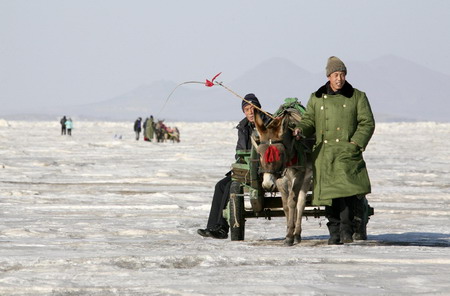source: China Daily
Shipping, fish farming hit by worst freeze in three decades
There is no need for fishermen to chain their boats to the shores of Juhua Island; they have all been frozen firmly to the spot since the Bohai Bay turned into a massive ice rink.
From the beach, the seascape is a glistening, unmoving block that has become impossible for ferries to navigate. Tricycle riders are the only ones brave enough to transport residents across the 7.5-km of ice that separates the island from Xingcheng, the closest city on the mainland in Liaoning province.
Some locals are even resorting to pao bing, running on ice, to fetch vital daily necessities.
"The ice is very thick this year so there is no danger of falling through," said fisherman Liu Ping, 42, as he paid 50 yuan ($7) for a tricycle ride. "I urgently need to make an appointment with a boat repairer in Xingcheng. If I don't, all the good ones will be fully booked by the time the ice melts in the spring."
The island's 3,200 residents have been cut off from the mainland since Jan 5 when the ice became too thick for boats to pass through. As it is hard to judge the depth of the ice, the local government banned pao bing and set up special patrols to prevent it. But people are still taking the risk.
Some residents in Sichengzi village use small electric tricycles to make runs to Xingcheng every morning and afternoon, charging passengers up to 100 yuan one way in severe weather.
A "safe" route has already taken shape on the ice and, watching from the shore, tricycles can be seen weaving in and out as they shuttle commuters along the well-used track. The riders know they are risking their lives for extra income so they often ride cautiously. "It takes me one hour to travel 5 km," complained a passenger surnamed Liu.
The highest volume of sea ice in three decades has affected fish farming, sea transportation and offshore oil drilling.
Those living on Juhua Island, the largest in the gulf, are no strangers to the situation. Bohai freezes every year and villagers are usually prepared. "The island has a long history and we have become used to life in winter, so in autumn we start storing rice, meat, vegetables and other necessities," said Liu.
Ships carrying food and other supplies were also able to reach the island on Jan 21, thanks to help from an icebreaker.
The biggest concern for islanders is medical treatment, said Huai Lixing, a local hotel manager.
"The island has only one hospital, although it is more like a village healthcare clinic," he said. "The doctors there cannot do a simple procedure like an appendectomy, let alone deal with a big problem. So anyone needing emergency treatment has no option but to pao bing.
"What we really need is a bridge to be built to the mainland, but that takes money and no one wants to invest."

No comments:
Post a Comment